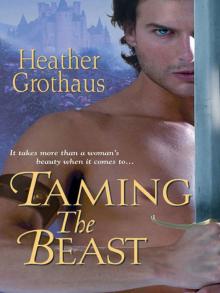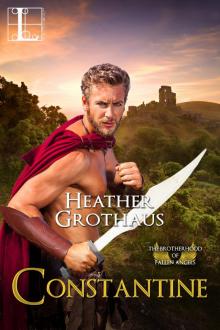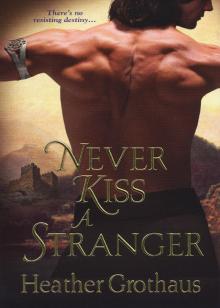- Home
- Heather Grothaus
Roman Page 13
Roman Read online
Page 13
Roman had no sooner stopped the cart—the little gray donkey hanging her head and giving a great mournful sigh—than van Groen had begun shouting out orders to those around him, calling for canvases, staves, paint. Roman turned to Isra and found that she was already climbing down from the seat, van Groen trotting around the wagon to offer his hand to assist her.
“Who has been in charge of Kahn’s care?” she demanded as her feet touched the ground, ignoring van Groen’s outstretched fingers.
“I have, mistress,” the man said, quickly regaining his composure. “There are none other in the band who dare draw near him.”
Isra turned her head and looked up at Roman, the question clear in her brown eyes. This woman was not the one he had rescued at Melk. Perhaps he had seen a glimpse of her that night in Damascus, when she had escaped her watchers to come to him and lead him to the prison, but whatever spark of spirit she’d shown that night had been all but extinguished by the losses she’d suffered. Up to this point, she had been afraid, unsure, behaving as if she were no better than a slave.
But when she had faced the tiger alone, knowing it could kill her in an instant, she had become . . . more. Perhaps it had been only recklessness; a hope that she would be killed—he remembered with a chill the way she had clutched the little golden dagger in the cell at Melk. But he didn’t think so.
He nodded to her. “Call for me if I may be of assistance.”
She gave him a slight smile before turning away, and Roman saw hope in her eyes. Asa van Groen kept pace with her, his upper body turned sideways as he chattered and gazed at her.
Roman had little time to stew in his dislike, though, for a group of people approached him now, their arms laden with the supplies van Groen had called for. Roman climbed down from the driver’s seat as more arrived with long poles and folded squares of cloth. He turned, his eyes catching sight of a tall, slender woman approaching the group, her white blonde hair twisted tightly back from her face, revealing sharp cheekbones and a pointed chin. She was perhaps a score and ten, her features striking, her eyes pinned on Roman as she walked toward him, carrying a long, shallow box with a dowel handle filled with squat, round crockeries.
She stopped before him and set the box down while two men unfolded one of the large squares of canvas on the ground. She set her hands on her hips and regarded him shrewdly. Her expression was impatient.
“What is your trick?” she asked.
Roman blinked. “I beg your pardon?”
“Your trick. Your show,” she said.
“I have no trick,” Roman said, glancing sideways as a trio of men climbed into the bed of his cart and began banging straightaway. “I’m only driving the cart.”
“You’re not the man who bested five of ours only this morning?” she pressed and glanced up at Lou, still perched on Roman’s shoulder. “Asa’s new darling is your woman?”
“She’s not my woman,” Roman said for the second time that day.
“The queen’s consort,” the woman said, ignoring his remark. “I’d warrant you’ll have a trick before long, should Asa have a say in it. Hmm. All right.” She turned away from him and squatted over her box while one of the men jumped down from the cart and approached the canvas.
He took a piece of charcoal from his pocket and measured with a short stick from each end and corner of the large rectangle, swiftly making black Xs along the thick material. He was finished in an instant, it seemed, pocketing the charcoal and returning to the cart while the two men on the ground began trimming away the parts outside the charcoaled marks with tapered blades. They gathered up the scraps as efficiently as kittens gathering yarn and were gone, leaving the blonde woman to pull her case closer to the edge of the canvas.
She took a brush from the box, its bristle head round and fat, its handle long and worn smooth. Then she uncorked one of the crocks and dipped the brush inside. A moment later, she was swinging her slender arm in wide, smooth strokes, leaving bold black arches on the cloth. Roman stepped closer to watch from above her.
She glanced over her shoulder. “I’m called Fran,” she offered. “I do portraits. And this,” she added, now swooping the brush in the opposite direction, until Roman could make out two elliptical shapes, mirroring each other on one half of the canvas.
“You’re the one who painted all the wagons?” he asked. The designs he’d seen were quite impressive.
She nodded her head but didn’t look at him again, absorbed in the image taking shape before her.
Roman looked around the camp; it seemed everyone was busy with some specific task. He saw no sign of Isra, and that caused him to frown a bit, but he let the annoyance go. The men in the cart bed were now half surrounded by a cage of wooden staves that seemed to grow taller by the moment. Roman spied a discarded hammer on the edge of the cart bed. He looked around again and saw that—besides the old hag who still tended the fire and seemed now to be talking to herself—not one person was idle.
Save him.
Roman walked toward the driver’s seat and deposited Lou on the arm of the bell stake; he would have to devise for the falcon a place of his own soon, and fashion another tether and hood as well. But for now, Roman walked to the back of the cart and picked up the hammer, reaching out at once to steady a tall upright for one of the men while he set a tapered iron pin.
The man looked up with an expression of surprise. “Well, all right, big fellow; have at it,” he invited in a jolly voice.
Roman slid the hammer up in his palm and banged the pin home in two blows. He looked up and saw that the blonde Fran was watching him once more over her shoulder. Even though she did not smile, Roman noticed again how comely she was.
“Look lively, now,” the man holding the stave called, and Roman looked back in time to take hold of the crosspiece while he lashed it to the upright.
And just like that, Roman felt part of the band.
* * *
Isra stalked toward the tall wagon that was Kahn’s prison, her stomach fluttery and light as Asa van Groen strode along at her side.
What was she doing?
What had she talked Roman Berg into?
Her sudden display of bravado was threatened as old fears rose up within her. She had no idea what she was doing, thinking to join this band of mad and thieving performers, or why. It was just as likely she would fail in her mission to save the exotic beast; he would die from his captivity any matter, or kill her while she was trying to help him.
Or the band could turn on Isra and Roman, robbing them, leaving them destitute on the road. If they found out who they were, that Roman had a large bounty on his head, they would surely betray them for the coin his capture would bring.
But the troubling thoughts wafted away like smoke as she spied the strangely dressed Dracus emerging from the wood beyond the wagon, two long, gray carcasses dangling from his hand. He held them aloft.
“The best I could do, mistress,” he called out, his solemn face hopeful.
Isra nodded to him and held out her hand.
Van Groen raised a long arm between Isra and the hunter. “I’ll throw them in; you’ve come close enough to danger this day.”
Isra felt her temper flare and she shoved van Groen’s arm down so forcefully that it caused the man to step back to keep his balance.
“He shall not eat in such filth,” she declared. Dracus came to a halt and looked between the pair with wide eyes in the awkward silence. She ignored the hunter as she continued to address van Groen, who now regarded her with an air of wariness.
“Where is the spade? The water and soap that are needed?”
“I can have them for you in an instant for certain,” van Groen allowed. “I am thrilled beyond measure that you have agreed to go on with us, but perhaps we should establish exactly who is in charge of this endeavor,” he said with raised eyebrows.
“Indeed,” Isra said, and the tremble returned to the pit of her stomach. It brought to mind all the men in her life—and th
e women, too—who had asserted their authority over her mind, her freedom, her body.
Never again, Isra thought to herself. And never again began at that moment.
“So let us establish it,” she continued. “I shall have free rein with Kahn. I shall order his care and needs, and my requests are to be heeded. If you think to command me in any way, we will take our leave as my lord wished to do.” She stared into Asa van Groen’s brown eyes and refused to let her gaze waver; there was too much at stake now, both for herself and Roman and the tiger. “Do you agree or no?”
To her surprise, Asa threw back his elegantly coiffed head and laughed. “So completely perfect!” he shouted. “Yes, my queen! Yes, I will obey.” His eyes were still crinkled at the corners when he looked at her. “And now you must understand that I can’t risk my life or any of the others’ to clean the crate to your precise specifications.”
Isra’s heart pounded in her chest as she realized the man’s shrewdness. She turned toward the wagon. “Is there another entrance?”
“Yes,” van Groen said. “It’s actually an old prison wagon.” He walked to the side of the cart and raised his arm, pointing to a line of round holes down the center of the box. “Iron bars can be inserted here to make two cells.”
Her eyebrows rose. “The wooden walls can be removed?”
“They can, but the walls support the bars,” van Groen warned.
“I see.” She didn’t relish the idea of being inside such a close, dark space with the animal, but it appeared she had little choice. “Have the bars fetched and send the supplies I asked for. Quickly, if you please, before the meat cools.”
It seemed only moments before a team of men arrived bearing the long black cylinders and shoved them through the wooden panels of the wagon, securing them on the far side with pins. While Isra waited, a pair of children brought a bucket of water and a rough cake of soap, someone else a hoary broom and a long, flat bladed spade.
Isra motioned for the children to come closer and then squatted down so that she was on eye level with them. “Thank you for helping Kahn,” she said. “Would you like to help him further?”
Both children nodded, their eyes wide.
“Go into yonder field and gather up as much dried grass and brush as you can. Put it into a pile here by the wagon. Lots and lots, yes? As tall a mountain as you can build.”
The children nodded again and turned in a run.
Isra rose from her crouch and picked up the spade. “Open the door.”
Van Groen himself once more scaled the ramp and then stepped onto the tall rear wheel with only one boot this time, unlatching the door before swinging it wide.
Isra marched up the narrow plank and passed into the dark rectangle. Her eyes searched the gloom of the far side of the box as she tried to breathe through her mouth. The stench was terrible. She caught sight of the great, defeated beast lying against the opposite door. His eyes were open and he looked at her, but Isra could see the despair in those dull yellow orbs.
Isra began shoveling, always facing the tiger, throwing spadesful of filth behind her through the opening. She was finished in only moments, although when she backed toward the door and held the spade through the opening she could feel the wetness beginning to soak through her gown beneath her arms.
“Broom,” she called as the spade was snatched from her hand. “Soap and water.”
Isra swept as much as she could through the doorway before tossing the entire cake of soap in the full bucket and then dunking the stiff bristles of the broom in the water. She felt for the firm soap on the bottom and pushed the broom into it.
Isra began to scrub the wagon, the tiger watching her the entire time, never moving, never making a sound, only following her movements with his tired eyes.
When she was finished, she dragged the bucket back toward the doorway and tossed the broom to van Groen. She emptied the bucket out the side of the opening and then threw that out as well. “Ready to remove the bars,” she said, and then she held out her hand toward Dracus.
The man came halfway up the ramp, holding forth the rabbits he’d so quickly procured, and Isra took them, turning back inside and facing the tiger.
“Hie, Kahn,” she said in a low voice and held up the rabbits by their long feet. She walked toward the bars. “These are for you.”
She stopped only an arm’s length away from the horizontal iron cylinders, the rabbits nearly touching the questionable divider. The bars were nearly a foot apart; should the tiger desire to suddenly rise and reach through them to claw at her, she would be dead.
Isra swallowed. “Hie, Kahn. Hie,” she repeated and shook the rabbits as if the motion would loosen the tremor from her own voice.
The tiger’s nostrils flared, his whiskers twitched.
“Hie. Up, Kahn,” Isra urged.
The tiger rolled onto its elbows at first, and then with something that sounded like a groan and a sigh, it began to pull itself to its feet.
“Yes,” Isra praised as she backed slightly away. “Hie, Kahn. Up.” She crouched down and lay the carcasses in the center of the clean space she had created and continued to back away. “Remove the bars,” she called over her shoulder as she reached the doorway. “The lowest ones first. Now,” she commanded when no one moved immediately, fearing Kahn would be frustrated by his inability to reach the meat and associate Isra with torment.
“Aren’t you going to come out first, mistress?”
“Do as I ask,” Isra said.
Isra watched as Kahn flinched and hesitated when the bar was withdrawn. But then the tiger stuck his head forward, his wide nose waving back and forth in the direction of the rabbits. The second bar slid back, allowing the tiger to push his head through into the half of the wagon where Isra stood near the door.
“Hie, Kahn,” she said again.
The third bar withdrew into the wood, and the tiger slowly crept toward the two gray lumps of fur. Isra could see the saliva starting to run from the tiger’s mouth. He glanced up at Isra, and she made certain to hold his gaze before she backed out onto the ramp.
“Hie, up. Come and eat.”
Kahn slunk fully into the other half of the wagon. Without looking away from the beast, she commanded the bars be returned. The tiger jumped and spun around with a warning scream as the bars slid past with a gritty hiss.
“Easy, Kahn,” Isra called, drawing the tiger’s attention back to her. He met her eyes and then lay down, curling his front paws around the meat. He looked away at his first crunching, tearing bite, and Isra reached out to close the door gently. She dropped the bar into place and then turned to walk down the ramp.
“He will need more meat,” she said to Dracus, who nodded and set off into the wood once more. Isra picked up the bucket and tossed it to van Groen before retrieving the discarded spade and broom. She turned her back on him as she walked toward the other end of the wagon, her work not yet half done.
Chapter 11
Roman and Lou went looking for Isra not long after the sun had reached its zenith, turning the autumn day warm and bright. The camp was alive with clatter and traffic, folk passing to and fro carrying stakes and scaffolds from the fire, clothes hung out to dry from a quick morning’s wash; harnesses jangled, wheels creaked. No one stared at Roman or paid him any mind at all really, and he had come to the determination that, to such an unusual band of people, he was nothing unique in any way.
Unlike blending into the brown wool population of Melk, where every man was an identical part of the whole, each individual in van Groen’s group was peculiarly distinctive, in some cases in highly bizarre ways. No one was strange because everyone was strange.
Roman approached the tall, rectangular wagon that was decorated like a forest canopy and saw Isra sitting beneath an actual tree not far from the wagon’s tongue. Her knees were drawn up beneath skirts that were dirty and dark with damp. She drank from a metal cup while Asa van Groen leaned against the tree next to her, chatting. Isra saw Rom
an right away, and he was surprised at the pleasure he felt when she smiled at him.
She began to rise, and although both van Groen and Roman reached out to assist her, it was Roman’s hand she grasped. Van Groen quickly pulled his velvet-clad arm behind his back.
She looked tired but satisfied as she greeted him. “My lord.”
He wanted to correct her again, but it was dangerous to reveal their identities to such a band of semicriminals as this. Especially before their leader, who seemed to be observing Roman and Isra very closely.
“Have you arranged things to your liking?” Roman asked.
Isra’s smile returned. “Kahn is much happier. It is my hope that he sees improvement with each new day.”
“Well done, then,” Roman said, echoing the praise she’d given him earlier.
Van Groen stepped forward. “It will have to do for now,” he said, his eyes flicking to the bustling camp beyond them. “We are moving too late as it is. But we are not so far from the Venice road; we will be able to travel much farther into the night than we could on yonder path.”
“You plan to perform in Venice, then,” Roman repeated.
“If we are lucky. It is in the many small villages before and after that we hope to see the bulk of our coin. The farther south we go, the weather shall warm, and so shall our welcomes.” Van Groen signaled with one finger to someone behind Roman before smiling up at him. “I am needed. Will the pair of you walk with me?”
Roman turned, irritated when Van Groen took up Isra’s other side.
“I would prefer you travel close to my wagon so that I might look after you until you find your way in our little family,” van Groen said. “But I have a feeling you wish to remain as unseen as possible on the road, and as it is I who must contend with constables and the like, it would be best if you found a place farther back in the band.” He looked ahead and smiled, his voice gentling to a wistfulness that sounded surprisingly genuine. “Ah. I see Fran has performed her magic once again.”
Roman turned his head to regard their now covered cart bed, and saw Isra’s eyes widen as she took in the black outline of the bird on the side of the canvas, its wings spread, its hooked beak in profile. The silhouette was filled in with bright gold and surrounded by shooting rays of what Roman supposed was the sun.

 The Highlander's Promise
The Highlander's Promise The Laird's Vow
The Laird's Vow The Scot's Oath
The Scot's Oath Taming The Beast
Taming The Beast Never Seduce A Scoundrel
Never Seduce A Scoundrel Roman
Roman Never Love a Lord
Never Love a Lord Never Love a Lord (Foxe Sisters)
Never Love a Lord (Foxe Sisters) Valentine
Valentine Adrian
Adrian Constantine
Constantine Never Kiss A Stranger
Never Kiss A Stranger